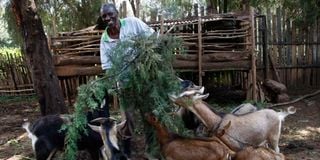Ex-pastoralist happy keeping dairy goats

Harrison Simotwo with his Alpine dairy goats on his farm in Silanga village in Mau Summit, Nakuru County.
The brown Alpine goats nibble at some twigs offered to them by owner Harrison Simotwo in Silanga village, Mau Summit in Nakuru County.
Simotwo, who keeps seven goats, six that he milks, says he went for the breed after selling three sheep from his flock to get Sh12,000.
“I bought a pregnant Alpine goat at Sh11,000 in the late 90s from a local farmer who had sourced it from Baraka Agricultural College in Molo,” he recalls, adding that he constructed houses for them spending some Sh30,000 in total.
The goat kid after two months to twins. He later added more goats.
“The goats live in the raised structures enabling him to maintain high standards of hygiene as they don’t step on dirty ground. The raised sheds also enable him to easily collect the manure,” explains Simotwo, a former pastoralist from Baringo.
Goat farming
According to him, goat farming is not costly thus anyone can afford to keep them.
“Goats are easy to keep and manage, especially for small-scale farmers. I am happy keeping these animals. They feed on everything green but should be de-wormed more often.”
The farmer collects some seven litres of milk a day, in the morning and evening. He sells the milk to locals as well as the goats themselves. A litre retails for between Sh150 and Sh200.
“The milk and animals have good markets. A mature Alpine goat goes for between Sh15,000 and Sh25,000.”
To avoid inbreeding, he sources for breeding bucks from fellow farmers and sells those that are birthed on his farm. He feeds the animals lucerne, napier and Boma Rhodes.
Simotwo, who recruits locals to keep dairy goats, is optimistic of becoming a major breeder. His target is to have over 200 quality animals that can kid twins two times per year.
Six goats
He decries the lack of extension services to help farmers better their ventures.
“The Ministry of Livestock officers should directly visit farmers and train them on how to boost goat farming,” says Simotwo.
To improve his knowledge in goat-keeping, the farmer is in various WhatsApp groups, watches YouTube videos and visits agricultural shows for lessons.
Kuresoi North livestock officer Antony Kariuki says as land sizes shrink and fodder becomes scarce due to climate change, goats are the livestock of choice.
“The amount of feeds that one cow can consume can be fed to six goats making them affordable. We urge farmers to deworm their animals after three months and plant more fodder trees,” he says.
He adds that the animals also need vitamins through injection or mixing with feeds and mineral salts for better performance. Vaccination is also recommended.





